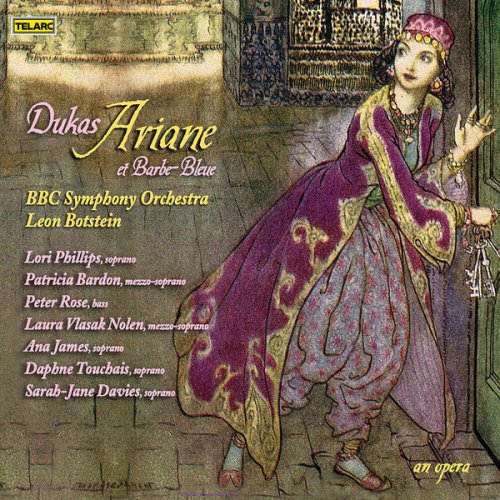
Leon Botstein - Dukas: Ariane et Barbe-bleue (2007)
BAND/ARTIST: Leon Botstein, BBC Symphony Orchestra, Lori Phillips, Patricia Bardon, Peter Rose, Laura Vlasak Nolen, Ana James, Daphne Touchais, Sarah-Jane Davies
- Title: Dukas: Ariane et Barbe-bleue
- Year Of Release: 2007
- Label: Telarc
- Genre: Classical
- Quality: FLAC (tracks)
- Total Time: 1:54:28
- Total Size: 469 MB
- WebSite: Album Preview
Tracklist:
01. Dukas: Ariane et Barbe-bleue, Act I: Prélude. L'avez-vous vue dans le carrosse?
02. Dukas: Ariane et Barbe-bleue, Act I: Où sommes nous?
03. Dukas: Ariane et Barbe-bleue, Act I: Quelle clef ouvrira la première?
04. Dukas: Ariane et Barbe-bleue, Act I: O mes clairs diamants!
05. Dukas: Ariane et Barbe-bleue, Act I: Ariane, que faites-vous?
06. Dukas: Ariane et Barbe-bleue, Act I: Vous aussi?
07. Dukas: Ariane et Barbe-bleue, Act II: Prélude. Écoutez!
08. Dukas: Ariane et Barbe-bleue, Act II: Ah! Je vous ai trouvées!
09. Dukas: Ariane et Barbe-bleue, Act II: Comment s'appelle celle qui revient?
10. Dukas: Ariane et Barbe-bleue, Act II: Où êtes-vous?
11. Dukas: Ariane et Barbe-bleue, Act II: Je vois la mer!
12. Dukas: Ariane et Barbe-bleue, Act III: Prélude. Nous n'avons pu sortire du château enchanté
13. Dukas: Ariane et Barbe-bleue, Act III: Il revient! Il est là!
14. Dukas: Ariane et Barbe-bleue, Act III: Madame? On peut entrer?
15. Dukas: Ariane et Barbe-bleue, Act III: Adieu
01. Dukas: Ariane et Barbe-bleue, Act I: Prélude. L'avez-vous vue dans le carrosse?
02. Dukas: Ariane et Barbe-bleue, Act I: Où sommes nous?
03. Dukas: Ariane et Barbe-bleue, Act I: Quelle clef ouvrira la première?
04. Dukas: Ariane et Barbe-bleue, Act I: O mes clairs diamants!
05. Dukas: Ariane et Barbe-bleue, Act I: Ariane, que faites-vous?
06. Dukas: Ariane et Barbe-bleue, Act I: Vous aussi?
07. Dukas: Ariane et Barbe-bleue, Act II: Prélude. Écoutez!
08. Dukas: Ariane et Barbe-bleue, Act II: Ah! Je vous ai trouvées!
09. Dukas: Ariane et Barbe-bleue, Act II: Comment s'appelle celle qui revient?
10. Dukas: Ariane et Barbe-bleue, Act II: Où êtes-vous?
11. Dukas: Ariane et Barbe-bleue, Act II: Je vois la mer!
12. Dukas: Ariane et Barbe-bleue, Act III: Prélude. Nous n'avons pu sortire du château enchanté
13. Dukas: Ariane et Barbe-bleue, Act III: Il revient! Il est là!
14. Dukas: Ariane et Barbe-bleue, Act III: Madame? On peut entrer?
15. Dukas: Ariane et Barbe-bleue, Act III: Adieu
Maurice Maeterlinck wrote his libretto for Ariane et Barbe-Bleu for Grieg, who rejected it, but Paul Dukas was delighted when it was offered to him. Completed in 1907, Dukas' opera appeared five years after Debussy's Pelléas, which it resembles in some of its text setting and in its sense of mystery. (Mélisande appears in the Dukas as one of Bluebeard's wives, but it's impossible to know if Maeterlinck had her back story in mind when he wrote the 1892 play on which Debussy based his opera. Dukas directly quotes Debussy's opera in connection with his character of Mélisande.) Like Debussy's opera, Dukas' is mysterious and psychologically troubling; after Ariane succeeds in freeing Bluebeard's five previous wives (a sixth wife -- "the black fairy" is ominously unaccounted for), the wives choose to remain in captivity in Bluebeard's dank prison. The music of Dukas' opera is more overtly dramatic than Debussy's and has a Wagnerian grandeur filtered through the delicacy of a thoroughly French sensibility. Its ripe romanticism is well suited to the libretto's gothic sensibilities. Ariane et Barbe-Bleu has everything to make it a popular success -- a dramatic and emotionally engaging story that offers the opportunity for scenically spectacular stagings, grateful vocal writing, and a sumptuous score. Critics speculate that its obscurity may be related to the timing of its appearance, just after Pelléas, and just before Bartók's Duke Bluebeard's Castle, which was based loosely on the same libretto; there were just too many Maeterlinckian symbolist operas for the repertoire to absorb in such a short time. The opera receives a compelling and colorful performance by the BBC Symphony Orchestra and the BBC Singers, led by Leon Botstein. Almost the entire vocal responsibility falls on Ariane, sung passionately with warm tone by Lori Phillips. The remaining characters, the Nurse, the wives, and Bluebeard himself, have incidental roles, but all are well taken and beautifully sung. Telarc's sound is warm and spacious.
As a ISRA.CLOUD's PREMIUM member you will have the following benefits:
- Unlimited high speed downloads
- Download directly without waiting time
- Unlimited parallel downloads
- Support for download accelerators
- No advertising
- Resume broken downloads


